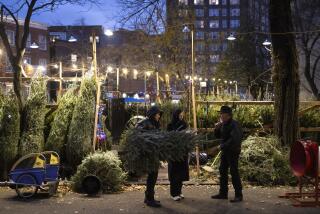Big Apple Takes Bite of Amish Apple Pie
- Share via
NEW YORK — Under a red-letter marquee, in the midst of exhaust-belching traffic and looming skyscrapers, a bearded Amish farmer in a blue work shirt, suspenders and straw hat hawks fresh baked breads and pies.
“A lot of people think it’s a gimmick. They don’t believe I’m Amish,” says David Wengerd, standing behind his goods laid out on a gingham tablecloth on busy Columbus Circle.
He is a traditionalist, a throwback to an earlier time, who offers American apple pie at one of the most hectic intersections in a city that would seem a tough place to be Amish.
Although Amish farmers had been coming out of the countryside for years to trade goods in nearby towns, falling farm prices in the late 1970s and early 1980s forced some to become full-time peddlers in big cities, according to “Amish Enterprise,” Donald B. Kraybill and Steven M. Nolt’s book on Amish culture and religion.
Wengerd, 54, started coming to New York City in 1985 because his Amish brethren from Pennsylvania already were selling their goods in cities closer to home.
“It doesn’t make sense to go where other Amish are selling,” he said.
Four times a week, Wengerd leaves his Pennsylvania farm at 2:30 a.m. to make the 160-mile journey to New York City.
Most Amish people, including Wengerd, do not use electricity, watch television or listen to music. Nor do they allow their pictures to be taken.
Because Amish culture forbids Wengerd to own a car, he has to hire a truck and driver to bring him to New York. He and a son sleep in makeshift bunks in the truck.
Wengerd’s family, including his wife and eight of his 11 children, bake the goods, made with fruit and vegetables grown on his 200-acre farm in Bloomsburg, Pa.
Columbus Circle, at the southwest corner of Central Park, is a gateway to the city’s Upper West Side. Wengerd has been there 18 months, along with other vendors who have been there for years.
Customers stop by Wengerd’s stand for muffins and breads to go with their morning paper and coffee.
“This is really fat-free? My wife isn’t going to get mad at me for eating this?” asked one man pointing to a loaf of fresh bread.
Often eyed oddly by Manhattan’s passers-by, Wengerd said most who inquire about him and his lifestyle are polite and inquisitive. He said the frenetic streets make him appreciate his crime-free home even more.
Thieves caught stealing food are asked to return it, unless they are hungry.
“We have a rule: Never turn away anybody that’s hungry. Everybody must eat,” Wengerd said.
On this day, a homeless man emerged from the park and eyeballed the bread and vegetables.
One of Wengerd’s employees, Aida Thaim, handed the man a small bag of goodies.
“He gives away everything,” she said of her employer.
But even for an Amish farmer in New York City, things must change.
Wengerd and several dozen other vendors have been told they’ll have to clear out in the coming months because of a project to remake Columbus Circle.
Developers have been given the go-ahead to build a $350-million complex--including a hotel, offices, condominiums and a 1,200-seat jazz concert hall--on the site now occupied by the New York Coliseum, a convention hall long plagued by financial and other problems.
Wengerd will have to find a new place to peddle his goodies. He also has four other New York City stands, although for his two employees at Columbus Circle a move far away could mean unemployment.
“When this happens, we lose our jobs,” said Thaim, 27, who gets $60 a day to work the Columbus Circle stand while Wengerd checks his other stands. “He says not to worry. But I do.”
More to Read
Sign up for Essential California
The most important California stories and recommendations in your inbox every morning.
You may occasionally receive promotional content from the Los Angeles Times.













